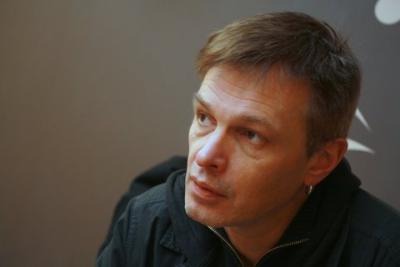G. VARNAS: “AN ACTOR SHOULD BE AN ARTIST RATHER THAN A STATE SERVANT” 0
Director Gintaras Varnas. Photos by Zenonas Baltrušis
In brief: Kaunas State Drama Theatre is creating its repertoire of the 90th season along with former most famous directors of this theatre. These are Jonas Jurašas, Jonas Vaitkus, Gytis Padegimas, Gintaras Varnas.
G.Varnas worked as the assistant director at Kaunas State Drama Theatre in 1987-1988, became the artistic head of the theatre in 2004-2007 and has staged 13 performances in the theatre. In 2008 he established the theatre Utopija.
In the interview, among other things, the director G.Varnas is asked about the Russian school of theatre.
“All Lithuanian theatre is mostly influenced by the Russian theatre. The exception would be only Juozas Miltinis of French style, who has no followers. The Russian school of theatre has made a huge impact on the theatre of Europe and the world. We have to admit that their school of theatre is very strong. I believe that both the theoretical works and practical achievements of Russian theatre people, their experience made an explosion inside our theatre at a certain time and created a phenomenon.
Speaking about the beginning of Lithuanian theatre, we should not forget the Baroque theatre of Vilnius University students; however, it is hard to say when and how we were affected by some schools and directions of the European theatre. I am sure that the original Russian sentimentality and sensitivity is best noticed in the Lithuanian theatre, especially in the works of directors of the elder generation,” G.Varnas points out.
The director was encouraged to remember Šėpa Theatre established by him. G.Varnas explains that this theatre was a response to the revolution that took place in 1988-1992, it was a reaction of citizens to the restoration of the independent state. This theatre enjoyed full halls of the audience as it was actual.
“Now people suffer from the routine and shortages in life, there is no revolution that would make one forget the daily life. Of course, art is capable of doing much at all times; still, it should be very diverse. The situation repeated itself two years ago, when "Duel of Tancredi and Clorinda" and "Dance of the Ungrateful" of Claudio Monteverdi were shown. Opera, Baroque, puppets: the combination of unpopular elements lured full halls. People needed a certain shelter from life and the unpopular became necessary. (…) We should not think that theatre has some special power; we cannot compare its impact on the audience with cinema and TV. We live in an interesting period of time: theatre experiences shrinkage, it is contracting; therefore, it should become deeper and turn into elite art. Otherwise, theatre will turn into a soap opera, series.
The logic of real theatre is not the “stars” but things the audience expects from you. You have to see the problem and to be able to show it, to make the audience hear you and persuade to follow you. Losses are inevitable; some performances cannot be shown in halls of a thousand seats. Such a tendency has been noticed in Europe a long time ago; sometimes a performance is shown in a room for a small number of spectators,” the director notices.
G.Varnas states that he has always worked in small halls of one or two hundred seats. Five hundred seats, like in Kaunas Drama Theatre, is not much as well, but this is the highest limit for him. The director believes that a drama theatre is not an opera.
As Kaunas State Drama Theatre is celebrating its 90th anniversary, G.Varnas is asked about his work at this theatre.
“First of all, I am glad that it was the time of big and important performances (“Heda Gabler”, “Mourning Becomes Electra”, “Distant Land”, “Dona Rosita, or Language of Flowers”, “Crime and Punishment”, “Devastated Land”, “Light-house”, “Innocent”, etc. – V.K.). It is very important for the director,” G.Varnas rejoices.
The reason why he left the theatre was the distrust of the theatre troupe of the director Ina Pukelytė, to whose team the director G.Varnas belonged. The director confronted the problem of full-time actors and invited actors in the theatre, when the former started expressing irritation about the money “eaten” by invited actors. According to the director, the system of the “state theatre” is faulty from the Soviet times as it interferes with the creation of art.
The director G.Varnas is preparing the play “Tiny Dynamite” of the contemporary British playwright Abi Morgan for the 90th anniversary of Kaunas Drama Theatre. The performance will be created by Utopija and Kaunas Drama Theatre together.
-----------------------
*) The actors of the Drama Circle performed “Feast of St. John” of Hermann Sudermann directed by Jonas Vaičkus for the first time at Kaunas City Theatre (present Kaunas State Musical Theatre) on the 19th of December of 1920. The history of professional Lithuanian theatre and Kaunas State Drama Theatre started with this premiere.


